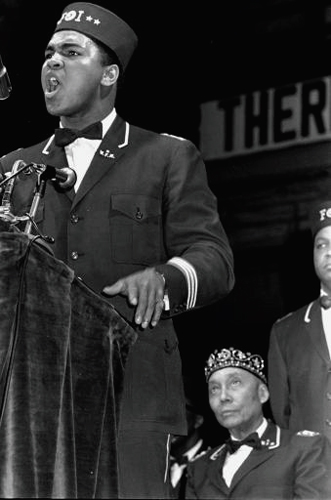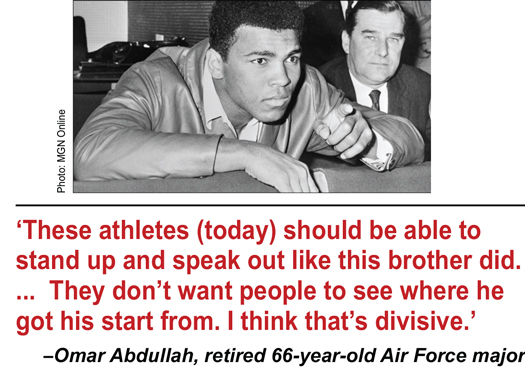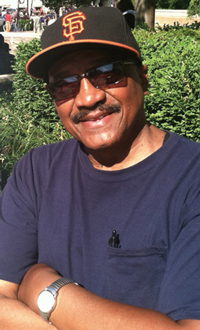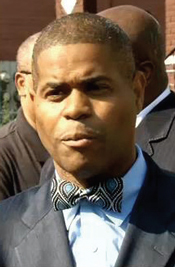Life of Ali an example of strength in tough times
By Richard B. Muhammad - Editor | Last updated: Jun 14, 2016 - 8:40:08 AMWhat's your opinion on this article?

|
While Mr. Ali rose to international fame and a global mission it was his love of Blackness, his courage, his commitment, his pride that remain essential today, said some who spoke to The Final Call in interviews.
The plight of Black people in the West End of Louisville and suffering across the world cries out for a dose of what made Mr. Ali a great man and a true hero, they said.
“I’m 37-years-old, a native of Louisville, Kentucky and right now we’re celebrating the life of Muhammad Ali. He was the greatest, he was the GOAT (Greatest Of All Time), he was the man. And we’re working with the kids in the community trying to keep them off the streets to know that Muhammad was a good man and to look up to people like him; do things right and stay out of the streets doing all these wrongs. We wish that people that people wouldn’t shoot or kill anymore, but right now we’re celebrating Muhammad Ali’s life,’” said Lakosha Thomas, who snapped photos of her 15-year-old daughter Shermayia Boswell in a boxer’s robe in tribute to the champ. Her daughter’s robe was part of an outfit her dance troupe used two years ago in an Ali tribute.

|
When Muhammad Ali Boulevard rolls away from downtown and into the neighborhood where he grew up, there are signs of blight and struggle as the demons of racism, discrimination, poverty, violence and police brutality still haunt the community.
“Muhammad Ali overcame it. He got through it, he lived through it, he spoke his mind and he stood his ground and that’s what we all need to do. We need to stop going against each other and work together to stop this violence especially anything that has to do with racism,” said Ms. Thomas.
The home where Muhammad Ali grew up has been turned into a museum and opened just days before his passing. It was an important stop for those who came back to remember a fallen hero in the Black and human struggle. Evan Bochetto, curator and creative director for the museum, said, “What we really wanted to do here is restore the home as a tribute to Muhammad Ali’s legacy and in doing so allow children from the neighborhood of the Western Louisville community to come here and be inspired just like Muhammad Ali had being trying to inspire children … we want to walk in his footsteps.

Omar Abdullah
|
“There are just too many children who are joining gangs and using drugs and drinking and they don’t have an outlet to believe in themselves. And we want to teach them while taking a tour of this museum. Muhammad believed in himself; he came from a humble beginning, he came from a segregated community but he had a determination and he had hope. And they too have determination and they too have hope, if they believe in themselves as well they can achieve anything they want to achieve.” The museum at is regularly open Thursday through Sunday and plans to offer educational programming.
The porch, yard and home and the railing of a home next door that serves as an administration center were filled with signs, photos, followers, balloons, boxing gloves and other symbols of love and honor dedicated to Mr. Ali.
Jerald Muhammad is the head of the Nation of Islam mosque in Louisville and part of a community organization called Brothers Helping Brothers. “My mother actually grew up on this street but we’re in front of the home of the great Muhammad Ali. He grew up in this house and Ali means something special to the people in this community. Of course our brother had a global impact but he means something special to the people in this neighborhood. They watched him grow up. There’s still people living in this neighborhood that babysat him. And stories about him, he wouldn’t ride the bus to school he would jog as his workout. After school he would follow the bus back home. We’re standing in a place where greatness was created.

Jerald Muhammad
|
“He said I would never denounce the Honorable Elijah Muhammad or Islam. He said I’d rather face machine gun fire other than do that. He was a person that did come through the neighborhoods. We were out here yesterday and people were telling us how he would go to the corner stores, he would go in and shake people’s hands, just the way the Minister would do in New York City. … That shows me that as a community organizer and a leader that the work is in the streets. We have to roll up our sleeves and do what Malcolm did, do what Muhammad Ali did and do what the Honorable Minister Louis Farrakhan is doing and that’s taking our work to the streets,” said Student Minister Jerald Muhammad.
Carol Qadar came to Louisville from New York with five of her seven children. The Muslim family wanted to make prayers for Mr. Ali. She sat on the floor of the Louisville Freedom Center with her daughter Yumnah, 23, awaiting the service at the Louisville Freedom Center. She grew up in the Nation of Islam where Elijah Muhammad’s fearless teaching brought her comfort as a child and Mr. Ali was another hero.
Mr. Ali changed the boxing industry by having creating ownership and extended opportunity to other people to do business with him, Ms. Qadar said. “I believe if African Americans and all people had that spirit, not selfish, like ‘I got all these degrees.’ If we all really had that generosity, not fearing losing, but being generous with what we had—which is what he did—I think we would see our neighborhoods improve overnight,” Ms. Qadar said. Mr. Ali is also an example for young entertainers and celebrities who are not as aware of the power of economic leadership, she said. “He was so generous,” said Ms. Qadar. “He was a great servant of God.”
Kim Clay brought his grandchildren Trammel Hayes, Malia Hayes and Italy Hayes to the June 9 janazah services for Mr. Ali and the memorial services the next day. It is important that the children learn important lessons about history, leadership, pride and excellence, said the Louisville resident. Mr. Ali “was very much a spokesperson for Black people, he was an inspiration somebody to look up to as a Black boy. He became the greatest to me when he gave up his title, gave up the money, gave up everything for his beliefs. That’s what a want to teach them, if you believe in something hold your convictions,” he said. “Look at the times we live in. It’s very hard for young Black kids.”
And, Mr. Clay continued, Mr. Ali became a humanitarian and an example of service to all suffering people. Ms. Qadar agreed with that view.
Juanita Turpin stood in line holding a framed photo of Muhammad Ali outside the Freedom Center where the Muslim prayer service was to be held. His son Zion, 16, was in tow. “Ali was love,” she said. Ms. Turpin wanted her son to experience everything he could of this great man. “I think we have had more killing in Louisville this year than ever. Our kids need to know there is another way to handle things,” she said.
Mr. Ali overcame great adversity, people respect him, she observed. “People hated him but now people love him,” she added.
What is needed is the Teaching of Elijah Muhammad that groomed Muhammad Ali, said Omar Abdullah, a retired 66-year-old Air Force major who drove down from Gary, Ind. He was sitting outside of the KFC Yum Center the day of the final memorial to the champion, who was stripped of his title April 28, 1967 and banned from boxing for three years for refusing to fight in the Viet Nam War. He was convicted of draft evasion, sentenced to five years in prison and fined $10,000. His conviction was eventually overturned by the U.S. Supreme Court.
Today’s athletes can draw courage to speak up and speak out on social issues from Mr. Ali and his public humility, he said. “This brother was making a lot of money and he never forgot the people. These athletes should be able to stand up and speak out like this brother did I think that’s the biggest. We still have these social problems on our people right here. .. They don’t want people to see where he got his start from. I think that’s divisive.”
INSIDE STORIES AND REVIEWS
-
-
About Harriett ... and the Negro Hollywood Road Show
By Rabiah Muhammad, Guest Columnist » Full Story -
Skepticism greets Jay-Z, NFL talk of inspiring change
By Bryan 18X Crawford and Richard B. Muhammad The Final Call Newspaper @TheFinalCall » Full Story -
The painful problem of Black girls and suicide
By Charlene Muhammad -National Correspondent- » Full Story -
Exploitation of Innocence - Report: Perceptions, policies hurting Black girls
By Charlene Muhammad -National Correspondent- » Full Story -
Big Ballin: Big ideas fuel a father’s Big Baller Brand and brash business sense
By Bryan Crawford -Contributing Writer- » Full Story






 Click Here Stay Connected!
Click Here Stay Connected!








